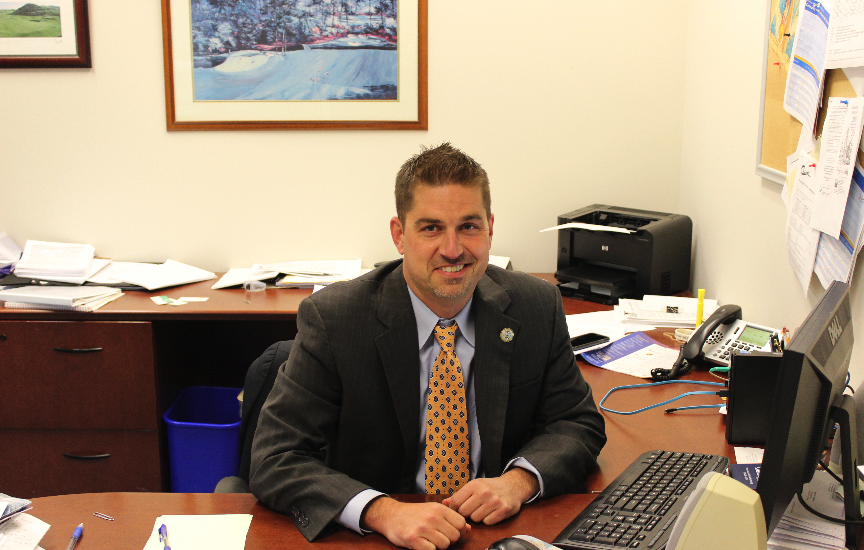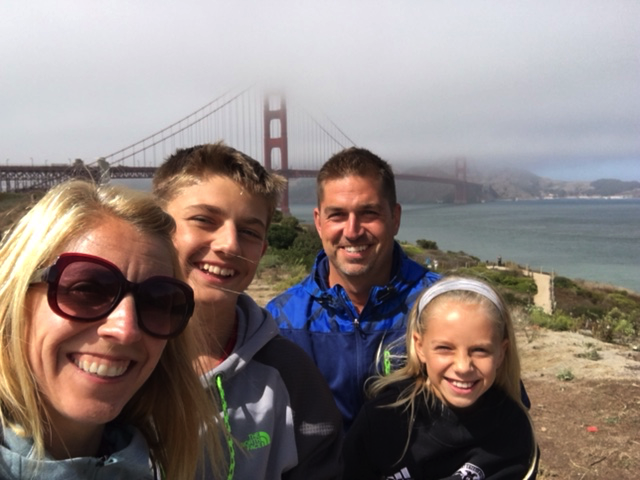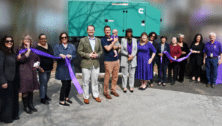Chester County Leadership: Michael Grigalonis

As the Chester County Economic Council put the finishing touches on their Annual Stakeholders breakfast Friday morning at the Desmond in Malvern, Michael Grigalonis, the organizations Chief Operating Officer spoke with VISTA Today about growing up in Pennsylvania’s coal region, playing baseball in high school and college before hanging up his cleats when playing the game stopped being fun, finding his way to the Philadelphia area after college, discovering Chester County and his 18 years at the CCEDC and the economic and development initiatives drawing his focus as 2016 draws to a close.

Where did you grow up Michael?
I grew up the second of two children in a small town of 3,000 residents in Pennsylvania’s coal region called Mahanoy City in Schuylkill County. Both my parents were born and grew up there. My father was in sales and managed one of the branches of Yellow Freight and my mother a school Psychologist.
The town is near Hazelton, so manufacturing drove the local economy. Since then, the town has fallen on hard economic times but still maintains much of the character that was there when I grew up.
What memories do you have growing up in such a small town?
I loved it! I wouldn’t change any of it. I remember having a great time with great people. I spent a lot of time hanging out with my buddies play pick-up baseball and basketball and going to a lot of family barbecues.
What was your first job?
I cut grass for my grandmother and a couple of neighbors through high school, but my first real paying job was working at Locust Lake, the local state park, for two summers my first two years of college. Every morning and again at the end of the day we would clean the park’s four bathroom facilities. In between, we would cut the grass and do general maintenance.
Any lessons from that first job stay with you today?
Aside from coming to the realization I didn’t want to clean bathrooms for a living, I picked up a sense of accomplishment of a job well done. Whether it was mowing the lawn or pulling together a good PowerPoint presentation here at the CCEDC, I know when I finished something I can be proud of my work.

Did you play any sports in high school or college?
I played baseball and basketball in high school and then baseball in college. I was a pitcher and infielder. I had a decent fastball and curveball, and my high school teams did well. I made my college team as a walk-on but when it started to feel more like a job, I knew it was time to hang it up!
Where did you go to college?
I went to Ithaca College in the Finger Lakes region in New York state. Even though I applied and was accepted at Loyola in Baltimore, I wanted to keep playing baseball and Loyola didn’t have a team . Ithaca, on the other hand, had a strong baseball program and a beautiful campus that overlooked the Cayuga Lake.
Did Ithaca end up being a good choice for you?
Winters in Western New York were tough, but otherwise, I enjoyed my time there. I majored in Exercise Science thinking I would find a job in a hospital setting or fitness club.
What kind of music were you listening to in High school and college?
My tastes in music were, and still are, pretty diverse. I’m not sure why, perhaps from my days playing basketball, but I have an R&B streak in me. Bell Biv Devoe, Jodeci, and New Edition were some of my favorite R&B groups in high school. But I was also into “college” bands like Toad the Wet Sprocket, Matthew Sweet and the early days of the Dave Matthews Band. And, my college roommates were huge Bruce Springsteen fans so I heard my share of Bruce in those days as well. . To this day I love music and am always singing around the house.
You graduate from Ithaca College in 1995. How did you get to where you are today?
After college, I moved to King of Prussia with some friends I met while interning at Hershey Foods. . I didn’t have a job but knew there was a lot of opportunity and figured I would find a position and get established. I landed a job in Wyeth’s medical affairs division writing reports on adverse drug reactions. I knew the job wasn’t what I wanted to do with my life, but it paid the bills. Over time, I figured out I wanted to do something in the way of business and went back to school for my MBA at Villanova.

In 1998, near the end of my MBA, I saw a posting for an internship at Chester County Economic Development Council. I had been to Chester County once or twice, but I didn’t have a clue of the position’s potential nor how successful Chester County was. The position intrigued me, however, so I did the research, applied for, and got the job.
What were you doing at the CCEDC when you first started?
For the first five years at CCEDC, I had two primary responsibilities; I was responsible for starting the International Trade Council as well as launching our workforce development initiative. The first project I worked on was a Workforce Summit in 1998. I’m proud that many of the ideas and programs that came from that summit are still active today..
What was your big break, Michael?
My big break came when Gary Smith stuck his neck out in 2004 and promoted me to Chief Operating Officer at CCEDC. I was only 30, and while the CCEDC was only 8 to 10 people at that time, the position was a big jump for me. We were entering a growth phase, diving deeper into the world of grants, expanding Seedcopa, and didn’t have a CFO at the time, so I was doing budgets and HR and a little bit of everything. I learned a lot and probably wouldn’t have survived without tremendous support I got from Gary, our Executive Committee and our Board.
What are your big challenges looking into the next six months?
Organizationally, we have several exciting initiatives under way. We’re looking at redeveloping abandoned or underutilized industrial sites across the county. This is not necessarily new for us but we have really made it a top priority now.
We’re seeing a lot of activity in our lending programs. And while we just wrapped up a very strong year and were once again the largest SBA 504 lender in our district, the marketplace has gotten much more competitive. We know that each year we have to work harder and smarter to stay on top. What’s encouraging to me is that we’ve always had a strong presence in the 504 space, but now we’re seeing more traction in the SBA 7A space as well.
We are preparing a comprehensive progress report for the VISTA 2025 Executive Alliance meeting in this month. There’s still a long way to go, it is a 10-year program after all, but I think people will be surprised by how much has been accomplished in the two years since VISTA 2025 was rolled out.
Of all the progress around VISTA 2025 you’ve experienced thus far, what single accomplishment are you most excited about?
This is a bit of an intangible, but I love how the county has embraced the notion of ‘quality of place’. ‘Quality of place’ is a hot topic in economic development nationwide and is seen by many as the number one factor in attracting top talent. We took Chester County’s quality of place for granted for a long time.
We knew the county was a great place to live and work, but since VISTA 2025’s launch in October 2025, we’re doing much more to promote and emphasize the county’s natural, historic, cultural and community strengths. It’s exciting to see the people in the county embrace the quality of place concept.
The other thing I’m excited about is the progress being made in Coatesville. There have been incremental gains in the past, but I’m starting to see the right initiatives, leadership and funding lining up to really make an impact. We have enough wealth and leadership in the county to make a difference in Coatesville. It’s going to take time and a lot of people and organizations rowing in the same direction, but I’m excited about Coatesville’s potential ten or fifteen years down the road.
What about the China initiative you’re working on with Commissioner Farrell?
Everyone knows there’s a lot of wealth in China as well as a lot of wealthy people who want to invest their wealth outside of China. Commissioner Farrell is trying to steer some of that money and wealth toward Chester County. We’ve had some success including hosting 6 or 7 delegations from China just in the last six months. The cool part about hosting these delegations is they travel from Los Angeles to Chicago, to Toronto to DC and then to Chester County. We are a destination, not a detour. These delegations come to Philadelphia specifically to visit Chester County!
When did the county’s focus on Chinese opportunity begin?
Commissioner Terence Farrell began the initiative in 2013 and remains both passionate and fascinated by China and the possibilities of closer business ties with Chester County. In 2013 when he wanted to host a Chinese delegation of 25 people, I wasn’t so sure it was a good use of my time or his. To see where it is now is a real credit to Terence’s vision and leadership.
What Chinese initiatives are you working on now?
There are a couple including a mushroom grower in China who is very interested in our more advanced approach to growing mushrooms. We’ve connected the Chinese grower with Chris Alonzo of Pietro Industries and facilitated three or four visits from the Chinese grower’s team to Chris’ Kennett Square facility. Chris is actually in China now to further investigate this cooperative opportunity and to educate Chinese mushroom growers attending a conference about modern American techniques of growing.
We’re hopeful this is the start of something huge not only for Pietro but others in the mushroom community. In addition, we continue to leverage our network to promote EB-5 projects in the region and are tentatively planning our return trip to China for Spring 2017.
You mentioned Gary Smith gave you your big break. You’ve worked with Gary for 18 years now. How would you measure Gary’s impact on the county?

Gary Smith has done a phenomenal job leading the CCEDC for forty years. He is an icon and a pleasure to work for and with. And while a lot of people may think the CCEDC is “Gary’s organization”, he would be the first to tell you the CCEDC is more than Gary Smith.
Gary attracts great people and is not afraid to share the credit or spotlight with others. His institutional memory of Chester County is remarkable. Gary remembers every building, where it is, and all the companies that have occupied the building going back fifty years. His impact is really immeasurable.
Finally, Mike, what is the best piece of advice you ever received?
My parents, through their example, taught me to be humble, have respect for others and to be genuine. I grew up in Pennsylvania’s coal region. It was a blue collar town with a shrinking economy and rising unemployment – there were definitely families struggling to make ends meet. My parents were both successful professionals so we never really struggled but were always empathetic to those that did and thankful for what we had.
I remember one time when I was in 3rd or 4th Grade, my cousin wanted to show me their family’s new car. The car was a used car, but new to them. My cousin was all excited about showing me the car and how the windows worked and the car’s cool features. I told him the car was nice but not as nice as our car. Afterward, my mother, who almost never got angry, let me have it. I don’t know why I remember that story, Probably, because it was my first lesson in humility.
Connect With Your Community
Subscribe to stay informed!
"*" indicates required fields











![95000-1023_ACJ_BannerAd[1]](https://vista.today/wp-content/uploads/2023/03/95000-1023_ACJ_BannerAd1.jpg)




































